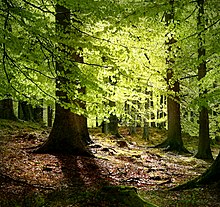European beech
|
Fagus sylvatica European beech |
|
|---|---|
 |
|
| European beech foliage | |
| Scientific classification | |
| Kingdom: | Plantae |
| (unranked): | Angiosperms |
| (unranked): | Eudicots |
| (unranked): | Rosids |
| Order: | Fagales |
| Family: | Fagaceae |
| Genus: | Fagus |
| Species: | F. sylvatica |
| Binomial name | |
|
Fagus sylvatica L. |
|
 |
|
| Distribution map | |
| Synonyms | |
|
|
Fagus sylvatica, the European beech or common beech, is a deciduous tree belonging to the beech family Fagaceae.
Fagus sylvatica is a large tree, capable of reaching heights of up to 50 m (160 ft) tall and 3 m (9.8 ft) trunk diameter, though more typically 25–35 m (82–115 ft) tall and up to 1.5 m (4.9 ft) trunk diameter. A 10-year-old sapling will stand about 4 m (13 ft) tall. It has a typical lifespan of 150–200 years, though sometimes up to 300 years. In cultivated forest stands trees are normally harvested at 80–120 years of age. 30 years are needed to attain full maturity (as compared to 40 for American beech). Like most trees, its form depends on the location: in forest areas, F. sylvatica grows to over 30 m (100 ft), with branches being high up on the trunk. In open locations, it will become much shorter (typically 15–24 m (50–80 ft)) and more massive.
The leaves are alternate, simple, and entire or with a slightly crenate margin, 5–10 cm long and 3–7 cm broad, with 6–7 veins on each side of the leaf (7–10 veins in Fagus orientalis). When crenate, there is one point at each vein tip, never any points between the veins. The buds are long and slender, 15–30 mm (0.59–1.18 in) long and 2–3 mm (0.079–0.118 in) thick, but thicker (to 4–5 mm (0.16–0.20 in)) where the buds include flower buds.
The leaves of beech are often not abscissed in the autumn and instead remain on the tree until the spring. This process is called marcescence. This particularly occurs when trees are saplings or when plants are clipped as a hedge (making beech hedges attractive screens, even in winter), but it also often continues to occur on the lower branches when the tree is mature.
Small quantities of seeds may be produced around 10 years of age, but not a heavy crop until the tree is at least 30 years old. F. sylvatica male flowers are borne in the small catkins which are a hallmark of the Fagales order (beeches, chestnuts, oaks, walnuts, hickories, birches, and hornbeams). The female flowers produce beechnuts, small triangular nuts 15–20 millimetres (0.59–0.79 in) long and 7–10 mm (0.28–0.39 in) wide at the base; there are two nuts in each cupule, maturing in the autumn 5–6 months after pollination. Flower and seed production is particularly abundant in years following a hot, sunny and dry summer, though rarely for two years in a row.
...
Wikipedia
